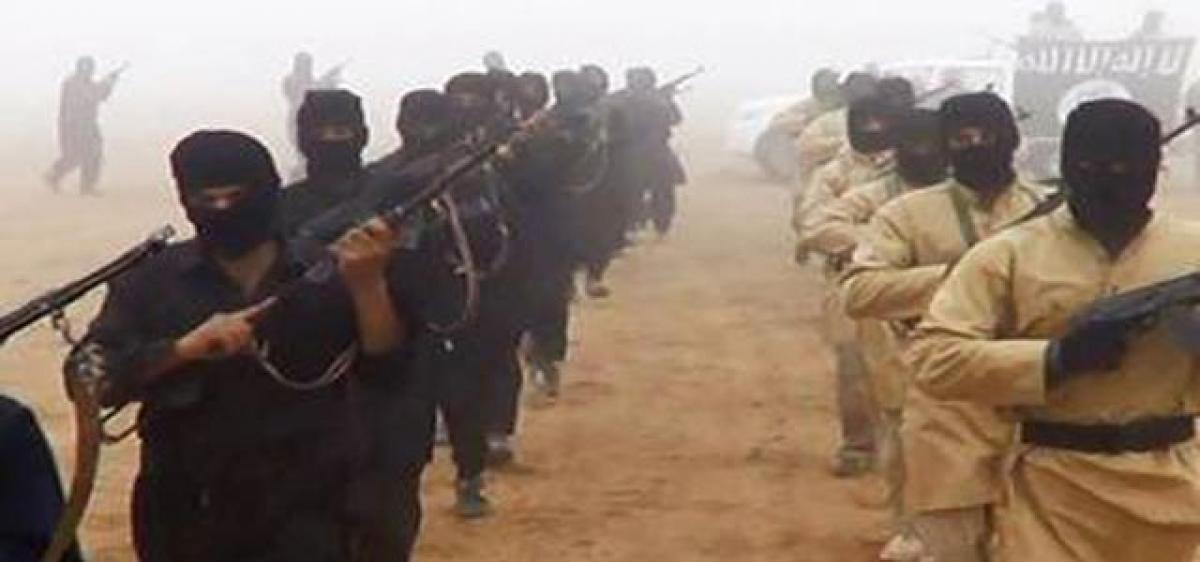Live
- Omar Abdullah Urges Congress To Earn INDIA Bloc Leadership Role
- Historic Temple In Sambhal Reopens After 46-Year Closure Following 1978 Riots
- Officials directed to work for deeper reach of guarantees
- Delay In 'One Nation, One Election' Bills Introduction Announced
- Exhilarating ‘Benchmark’ of Venkat Changavalli
- Development activities worth `30 cr launched in Puthalapattu constituency
- Allegations against KTR baseless: BRS leader
- Megastar Chiranjeevi to Visit Allu Arjun’s Residence at 12 PM Today
- Nilima Rane: Trailblazer in Nursing
- Casual yet stylish office outfits for all-day comfort
Just In

President Donald Trump has set out to crush Islamic State (IS) when it is already at a low ebb, but Islamists and some analysts say his actions could strengthen the ultra-hardline group by creating new recruits and inspiring attacks on US soil.
Beirut : President Donald Trump has set out to crush Islamic State (IS) when it is already at a low ebb, but Islamists and some analysts say his actions could strengthen the ultra-hardline group by creating new recruits and inspiring attacks on US soil. IS has been weakened in recent months by battlefield defeats, the loss of territory in Iraq, Syria and Libya, and a decline in its finances and the size of its fighting forces.
Trump's pledge to eradicate "Islamic extremism" looks at first sight to be yet another blow to Islamic State's chances of success. But Middle East experts and IS supporters say his election triumph could help revive the group's fortunes. They also believe his move late last month to temporarily ban refugees and bar nationals from seven mainly Muslim countries could work in the group's favour.
The executive order, on which IS has been silent, is in limbo after being overturned by a judge. But whether or not it is reinstated, it has angered Muslims across the world who, despite Trump's denials, see it as evidence that he and his administration are Islamophobic.
White House spokesman Sean Spicer said last week: "The president's number one goal has always been to focus on the safety of America, not the religion. He understands that it's not a religious problem." Denying the travel ban would make the United States less safe, Spicer has said "some people have not read what exactly the order says and are reading it through misguided media reports." Yet such comments have not silenced the criticism.
"The ban on Muslim countries will undoubtedly undermine the global effort to discredit extremists," said Hassan Hassan, a writer on Islamist radicalism and co-author of the 2015 book "ISIS: Inside the Army of Terror." The Organization of Islamic Cooperation (OIC), which comprises 57 member states, said such "selective and discriminatory acts will only serve to embolden the radical narratives of extremists."
Jihadists are still celebrating Trump's election triumph in online forums, saying it vindicates their argument that his views show the United States' true face and that his policy will polarise communities, one of the militants' goals.
Declining fortunes
IS has in recent months been significantly weakened on many fronts, with the caliphate it has created in parts of Iraq and Syria – where it has also imposed its ultra-hardline rule on residents – shrinking.
In Iraq, the group has lost territory in and around its northern stronghold of Mosul since US-backed Iraqi forces last October began the biggest ground operation in the country since the 2003 US-led invasion that toppled Saddam Hussein. IS still holds swathes of Syrian territory and is putting up fierce resistance in Raqqa, its capital in eastern Syria.
IS elments still hold around 90 per cent of the province of Deir Ez-Zor near the Iraqi border, along with Raqqa and some parts of the eastern countryside of Aleppo in northern Syria. It also controls Palmyra and some pockets in Deraa in the south.
Its opponents in Syria include the Turkish army and Syrian rebel groups northeast of Aleppo. On several fronts it is fighting Syrian government forces supported by the Russian air force and Iranian-backed Shi'ite militia. Syrian President Bashar al-Assad has indicated he sees Trump's views on Islamic State as promising.
In Libya, IS has lost control of the Mediterranean port city of Sirte to Libyan forces backed by US air strikes. The number of IS fighters is now estimated by analysts and experts to be at 20,000 in Iraq and Syria compared with 36,000 in 2014. Since then, a large number of fighters and IS leaders have been killed in air strikes by the US-led coalition and others have been captured by the Iraqi army or fled the country.
Now, some Islamist experts believe, IS may redouble its efforts to strike inside the United States, and replicate the fatal attacks carried out in the last 15 months in Paris, Brussels, Nice, Berlin and Istanbul. Trump's overtures to President Vladimir Putin suggest Russia and the United States could become closer in the fight against IS, though many of their goals and allies are different.
This potentially budding relationship could also be an opportunity for the Islamic State ideologues. Analysts say it has already come to see Russia's alliance with Shi'ite Iran as a recruiting tool because it has caused such anger among some Muslims.
By Samia Nakhoul

© 2024 Hyderabad Media House Limited/The Hans India. All rights reserved. Powered by hocalwire.com







